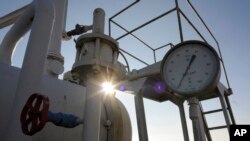FRANKFURT/BRUSSELS —
Political talks between EU officials and Russia on its South Stream gas pipeline to bypass Ukraine are on hold, while Gazprom's access to another vital link has stalled for technical reasons, the European Commission said on Monday.
Relations between Russia and the European Union have been thrown into turmoil by Russia's seizure of Ukraine's Crimea region.
In Brussels, the crisis is likely to intensify efforts to reduce energy dependence on Russia, while Moscow has long sought to curb its reliance on Ukraine as the main transit route for Russian gas to Europe, its biggest market.
Russia has begun building South Stream to carry up to 15 percent of Europe's annual gas demand via the Black Sea by 2018.
But so far the pipeline has not met EU law, which does not allow energy producers and distributors to own the pipelines they use. It also requires bilateral agreements between Russia and the nations through which South Stream will pass to comply with EU legislation.
Oettinger told German newspaper Die Welt, discussions with Russia on the link were suspended.
“I won't accelerate talks about pipelines such as South Stream for the time being, they will be delayed,” Oettinger, a German national, was quoted as saying.
Commission spokeswoman Sabine Berger said he was referring only to political talks, and technical contact was ongoing.
The European Commission has made clear the South Stream pipeline faces a long wait for legal clearance.
Nord Stream to Germany
Russia's major alternative to the Ukraine route is the Nord Stream pipeline, which already ships Russian gas to Germany and avoids Ukraine. Gazprom says the potential to pump more is limited by EU rules on how much access it can have to the Opal link from a northern German landing point to the Czech Republic.
Russian President Vladimir Putin said in January the Commission had agreed to allow Russia 100 percent access.
The EU spokeswoman said the executive had agreed with the German Federal Network Agency to prolong the deadline for a decision on Opal, citing a need for “technical clarifications”.
“The Commission aims for rapid clarification of the remaining issues and will work on this together with the relevant authorities,” she said.
Opal has capacity of 36 billion cubic meters, but industry sources said it has been operating at half that for the last three years.
Russia and the Commission are also at odds over an inquiry into Gazprom's suspected anti-competitive behavior, including overcharging customers and blocking rivals.
A Commission spokesman said the Ukraine crisis would have no impact on this inquiry.
“It's very simple. There is no influence whatsoever. Our investigation is ongoing and continuing as planned,” Antoine Colombani told reporters on Monday.
Relations between Russia and the European Union have been thrown into turmoil by Russia's seizure of Ukraine's Crimea region.
In Brussels, the crisis is likely to intensify efforts to reduce energy dependence on Russia, while Moscow has long sought to curb its reliance on Ukraine as the main transit route for Russian gas to Europe, its biggest market.
Russia has begun building South Stream to carry up to 15 percent of Europe's annual gas demand via the Black Sea by 2018.
But so far the pipeline has not met EU law, which does not allow energy producers and distributors to own the pipelines they use. It also requires bilateral agreements between Russia and the nations through which South Stream will pass to comply with EU legislation.
Oettinger told German newspaper Die Welt, discussions with Russia on the link were suspended.
“I won't accelerate talks about pipelines such as South Stream for the time being, they will be delayed,” Oettinger, a German national, was quoted as saying.
Commission spokeswoman Sabine Berger said he was referring only to political talks, and technical contact was ongoing.
The European Commission has made clear the South Stream pipeline faces a long wait for legal clearance.
Nord Stream to Germany
Russia's major alternative to the Ukraine route is the Nord Stream pipeline, which already ships Russian gas to Germany and avoids Ukraine. Gazprom says the potential to pump more is limited by EU rules on how much access it can have to the Opal link from a northern German landing point to the Czech Republic.
Russian President Vladimir Putin said in January the Commission had agreed to allow Russia 100 percent access.
The EU spokeswoman said the executive had agreed with the German Federal Network Agency to prolong the deadline for a decision on Opal, citing a need for “technical clarifications”.
“The Commission aims for rapid clarification of the remaining issues and will work on this together with the relevant authorities,” she said.
Opal has capacity of 36 billion cubic meters, but industry sources said it has been operating at half that for the last three years.
Russia and the Commission are also at odds over an inquiry into Gazprom's suspected anti-competitive behavior, including overcharging customers and blocking rivals.
A Commission spokesman said the Ukraine crisis would have no impact on this inquiry.
“It's very simple. There is no influence whatsoever. Our investigation is ongoing and continuing as planned,” Antoine Colombani told reporters on Monday.





